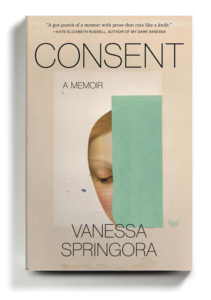This review contains details of child abuse that may be upsetting to read.
The French have been deeply shaken and scandalized by the publication of Vanessa Springora’s book Consent. In her literary debut, the author offers a heartbreaking testimony about the abusive relationship she had with the renowned writer, Gabriel Matzneff, during the 1980s. At the time, she was 13 years old and he was about to turn 50. Truth be told, her memoir is acidic and painful, but it is especially crucial in times of the #MeToo movement.
Springora begins by describing her childhood longings and the separation of her parents. She confesses that growing up without a father figure left her with a deep emptiness. In her grief, she takes refuge in her mother and in literature. Very soon, Vanessa becomes a lonely and love-starved girl and this makes her an ideal prey for any pedophile.

In 1985, Vanessa meets Gabriel Matzneff, a socially celebrated intellectual, even appreciated by the President François Mitterrand. For the first time, the teenager arouses the interest and admiration of a man. “His eyes followed my every movement, and when I finally dared to turn toward him, he threw me a smile”. In her naivety, she believes she is the protagonist of a great love story. The schoolgirl, a virgin of any romantic experience, succumbs almost immediately to the courtship of a dangerous child abuser.
From then on, a story of influence, coercion, and domination begins. The writer, more than thirty years older, dedicates all his cunning and intelligence to seduction and conquest. “G. declared his love for me in every possible way, begged me to come back and see him as soon as I could, vowed he couldn’t live without me”. Being an experienced pedophile, the artist uses a premeditated and effusive courtship. He visits Vanessa after school and dupes her with flattering letters. The minor, unable to imagine the truth, takes the bait.
At an age when any adolescent begins to define essential personality traits, Springora finds herself under the authority of a perverse manipulator. Too young and inexperienced, Vanessa gives herself completely to the promise of an exceptional love. “I was in love. I felt adored as never before. And that was enough to efface all my sullenness, and to suspend any judgment about our relationship”. As expected, a sexual encounter does not take long to happen.
“When you’re fourteen, it’s not normal for a fifty-year-old man to wait for you outside your school.”
With an enormous power of conviction, Matzneff takes over the identity and the youth of the schoolgirl. Little by little, he overrides her right to think and rebel. “I met G. when I was thirteen. We became lovers when I was fourteen. Now I’m fifteen and I had no means of comparison, since I had never known any other man”. The French editor says that under the psychological control of the intellectual, she begins to isolate herself from her surroundings and her affections. Gabriel’s presence is such that he leaves no room for friends, parties, or concerts. As the twisted relationship progresses, Vanessa contemplates her own dispossession.
“When you’re fourteen, it’s not normal for a fifty-year-old man to wait for you outside your school. It’s not normal to live with him in a hotel, to find yourself in his bed at teatime with his penis in your mouth… I instinctively understood that the fact that no one ever expressed surprise at the situation meant the world around me was out of kilter”, Springora says in a particularly revealing passage of the novel.
The author comments that Matzneff uses the façade of the artist in love to justify his perversions. In this sense, the intellectual comes to enjoy such prestige that he never feels the need to hide his sexual inclination towards minors. In fact, for years, he publishes novels in which he boasts of his conquests and his sexual encounters with virgin girls or barely pubescent boys. In the publication “Under Sixteen”, Matzneff leaves insights like this: “What captivates me is not so much a specific sex, but rather extreme youth, the age between ten and sixteen, which seems to me to be more than what we usually mean by this phrase – to be the real third sex”.
Springora says that her mother was the first person to warn her about the dangers of a relationship with the artist. At first, the shocked woman opposes the romance and tries to set limits. However, Matzneff, with his aura of transgressive genius, manages to win her approval. Apparently, the schoolgirl’s mother believed in the spirit of the May ’68 generation.
It is important to point out that, following the events of May ’68, French sexuality began to be promoted free of moral and ecclesiastical constraints. Young activists rebelled against puritanism, conservative morals, and dominant values. With slogans such as “Forbidden to forbid”, the sexual revolution reaches its peak. There is definitely a before and after this movement.
To get an idea of the impact of the liberalization of customs, in 1977, progressive intellectuals, such as Roland Barthes, Louis Aragon, Simone de Beauvoir and Jean-Paul Sartre signed a plea in favor of the decriminalization of sexual relations between adults and minors. The advance of sexual freedom brought with it new forms of abuse and vices.
Can minors consent?
In an effort to explain things as they happened, and to clarify why they occurred, the book invites us to reflect deeply on the consent of all those involved in this story. For, while it is true that the schoolgirl consented to the romance with the writer, it is also true that she made the decision under ambiguous and questionable circumstances.
It is worth noting that sexual consent implies the existence of two beings endowed with reason and emotional maturity. In Vanessa’s case, at only 13 years of age, she was not mature enough to understand the meaning and transcendence of her own sexuality. Hers was a naïve and immature decision. As this autobiography shows, it is very easy for an adult to seduce a minor who is just waking up to life.
According to Springora, Gabriel Matzneff’s excesses and abuses were prolonged due to the permissive and complacent framework of French society. Probably in a different environment, where celebrities did not provoke such a furore, the story would have been different. Any confessed pedophile would have had to face justice. The French editor wonders if art excuses everything.
It is fair to say that this minor was not condemned by her own consent, this minor was condemned by the consent of her mother, of her relatives, of the authorities, of the editorial circles, and of many others who preferred to be indifferent. The whole system failed.
Vanessa’s memoir
Undoubtedly, Vanessa Springora’s literary debut teaches us important lessons about abusive relationships, pederasty, and the vagueness implicit in sexual consent in minors.
Kate Elizabeth Russell has described it as: “A gut-punch of a memoir with prose that cuts like a knife”, and it truly is.
Image credit: Matias North

